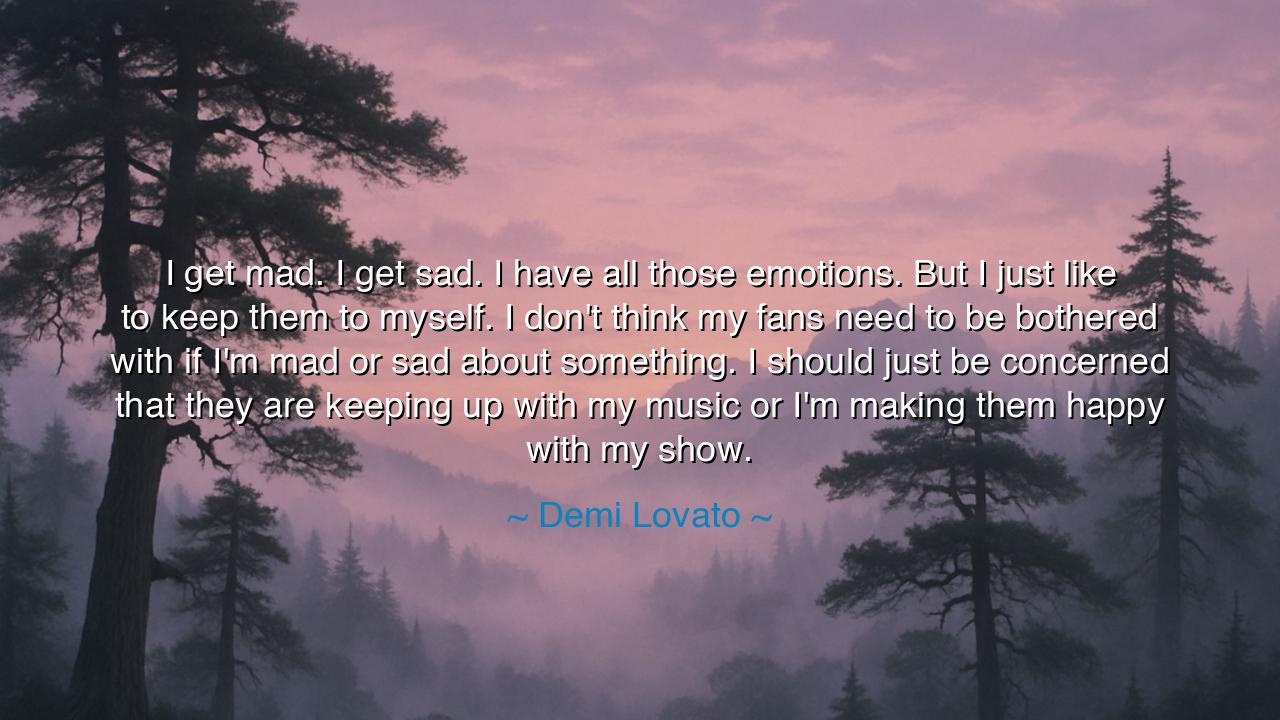
I get mad. I get sad. I have all those emotions. But I just like
I get mad. I get sad. I have all those emotions. But I just like to keep them to myself. I don't think my fans need to be bothered with if I'm mad or sad about something. I should just be concerned that they are keeping up with my music or I'm making them happy with my show.






In the heartfelt words of Demi Lovato, we hear both strength and restraint, both honesty and duty: “I get mad. I get sad. I have all those emotions. But I just like to keep them to myself. I don’t think my fans need to be bothered with if I’m mad or sad about something. I should just be concerned that they are keeping up with my music or I’m making them happy with my show.” These words, simple on the surface, reveal the ancient struggle between the private self and the public self—the eternal tension between what we feel within and what we must show to the world. It is the confession of one who bears both the weight of art and the burden of expectation.
In this reflection, Demi Lovato stands in a long line of artists, leaders, and thinkers who have known the discipline of emotional restraint. To be seen by many, to be admired by crowds, is a sacred yet heavy thing. It demands that one hold back their storms so that others may bask in their sunlight. When she says she prefers to keep her emotions to herself, she is not denying her humanity; rather, she is practicing an ancient form of service—the art of offering joy to others even while tending quietly to one’s own sorrow. It is the spirit of the performer, the healer, the leader: to absorb pain privately so that others may feel uplifted.
The ancients understood this balance well. Consider the story of Marcus Aurelius, emperor of Rome and philosopher of the Stoic school. He ruled an empire wracked by war, plague, and betrayal. In his private writings, later known as Meditations, he confessed to fear, anger, and grief—yet he never allowed these emotions to cloud his public duty. “Waste no more time arguing about what a good man should be,” he wrote. “Be one.” Like Demi, he knew that while the heart may storm, the face must stay calm, for others draw strength from one’s composure. Such restraint is not the absence of emotion; it is the mastery of it.
And yet, Demi Lovato’s words also carry a quiet sadness—a recognition of the loneliness that can come with fame. She admits, “I get mad. I get sad,” but she hides these feelings from her audience. There is nobility in this, but there is also sacrifice. The one who gives joy to many often has few to share their burdens with. The ancient poets spoke of this, too: of the bard who sings for the village yet weeps alone by the riverbank when night falls. It is the price of the gift—the knowledge that to lift others, one must sometimes bear solitude.
But within that solitude lies wisdom. For the one who learns to contain emotion learns also to understand it deeply. Like a sculptor shaping stone, the artist who holds their feelings within refines them into art. Demi Lovato’s music itself becomes the vessel for her unspoken emotions. She may not share her pain in words, but it finds its way into melody and rhythm. This is the ancient alchemy of creation: transforming the raw fire of feeling into something that warms others. Just as the blacksmith endures the heat to shape the blade, so does the artist endure emotion to shape meaning.
From her confession, we draw a timeless lesson—that there is dignity in composure, but also the need for balance. The wise do not suppress their emotions entirely; they channel them with purpose. It is good to feel anger, sadness, or grief, for these are the colors of the soul. But it is greater still to know when and how to express them. The ancients taught that discipline of the heart is the foundation of strength. To feel deeply, yet not be ruled by what one feels, is the mark of maturity and grace.
So, O listener, take these words to heart: when storms rise within you, do not be ashamed of them—but learn to govern them as a captain steers his ship through tempests. Share your light generously with the world, but tend to your shadows in peace. Demi Lovato’s wisdom reminds us that those who create joy often walk through sorrow unseen, and that strength is not the absence of emotion, but the quiet mastery of it. Let your emotions serve your purpose, not destroy it. For in this lies the art of living—the harmony of heart and duty, of truth and grace, of humanity made noble through restraint.






AAdministratorAdministrator
Welcome, honored guests. Please leave a comment, we will respond soon